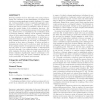Free Online Productivity Tools
i2Speak
i2Symbol
i2OCR
iTex2Img
iWeb2Print
iWeb2Shot
i2Type
iPdf2Split
iPdf2Merge
i2Bopomofo
i2Arabic
i2Style
i2Image
i2PDF
iLatex2Rtf
Sci2ools
143
click to vote
GECCO
2010
Springer
2010
Springer
Coevolution of heterogeneous multi-robot teams
Evolving multiple robots so that each robot acting independently can contribute to the maximization of a system level objective presents significant scientific challenges. For example, evolving multiple robots to maximize aggregate information in exploration domains (e.g., planetary exploration, search and rescue) requires coordination, which in turn requires the careful design of the evaluation functions. Additionally, where communication among robots is expensive (e.g., limited power or computation), the coordination must be achieved passively, without robots explicitly informing others of their states/intended actions. Coevolving robots in these situations is a potential solution to producing coordinated behavior, where the robots are coupled through their evaluation functions. In this work, we investigate coevolution in three types of domains: (i) where precisely
| Added | 12 Oct 2010 |
| Updated | 12 Oct 2010 |
| Type | Conference |
| Year | 2010 |
| Where | GECCO |
| Authors | Matt Knudson, Kagan Tumer |
Comments (0)

